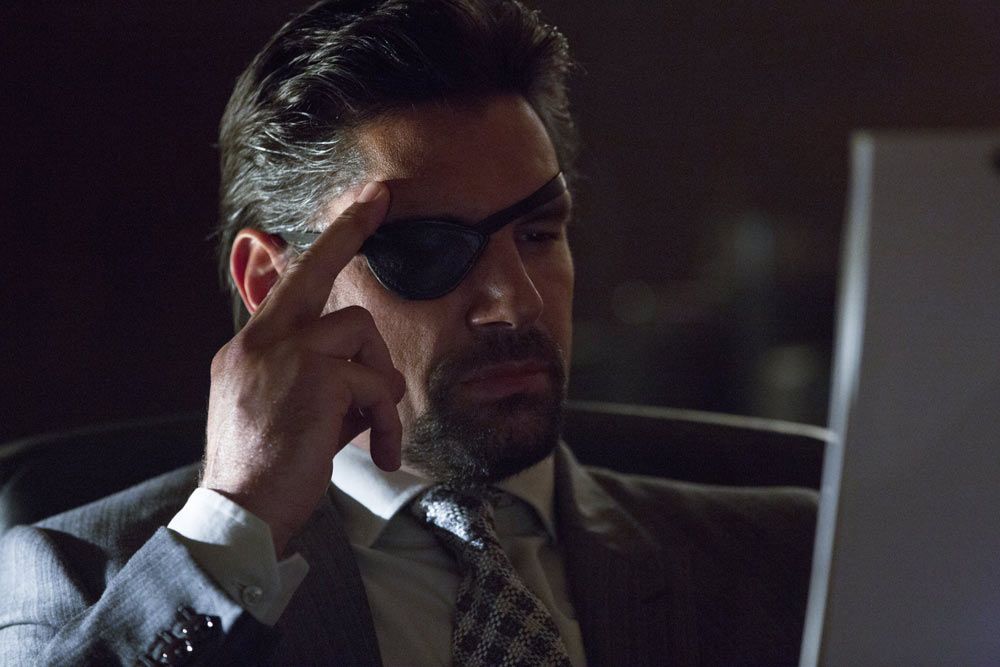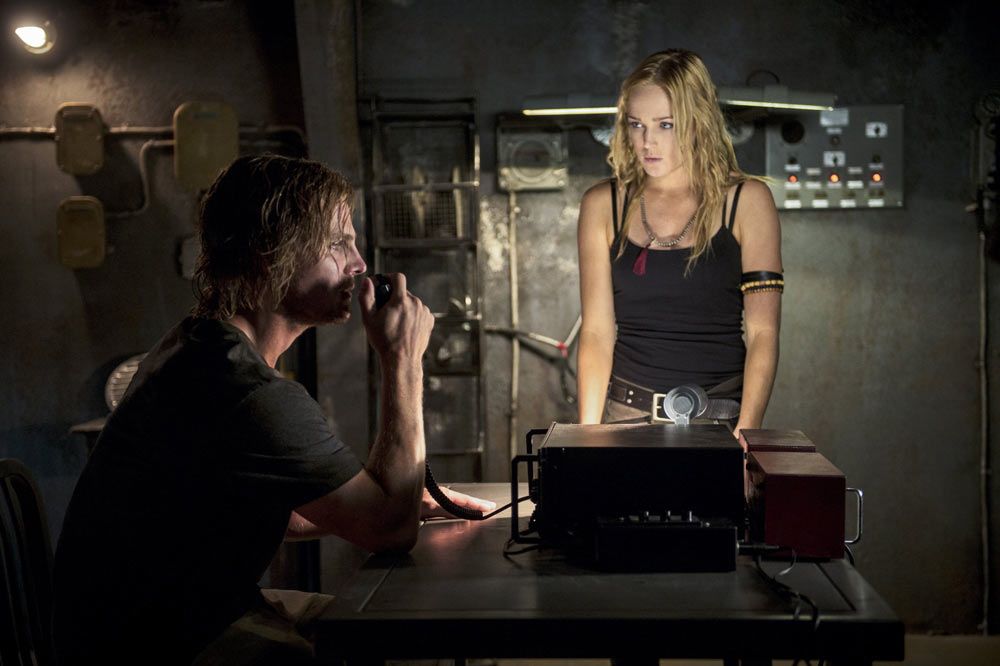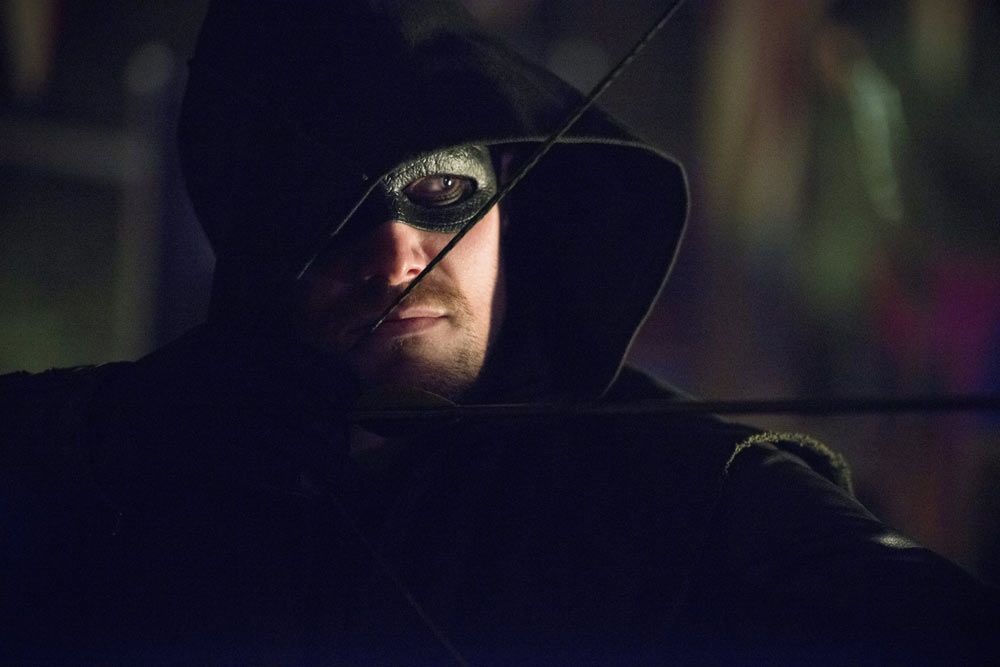TV's Oliver Queen may be wearing a mask now, but it won't be getting any easier for the young billionaire to play hero in The CW's "Arrow."
The show returns tonight at 8:00 Eastern and Pacific with a decidedly different take on supervillain Shrapnel, but for longtime followers of the show, the bad guy of importance is former ally Slade Wilson, who showed up at the tail end of "Arrow's" midseason finale with one-eye and a vendetta against Queen. Meanwhile, city councilman Sebastian Blood is continuing his spread of the superpowering and super unstable Mirakuru drug which changed Slade during Olvier's years on the island. And all this happens against a shifting ground for Oliver's teammates after the introduction of Barry Allen.
Sean Maher Blows Up "Arrow" as Shrapnel, Teases Dick Grayson Role
To catch up with the changes behind and those coming ahead, CBR News spoke with executive producer and show runner Marc Guggenheim about "Arrow's" return. Over the course of our discussion, the writer details how the introduction of Black Canary changed the show for the better, what it takes to make DC Comics-originating characters like her and Slade work in the realistic setting of the television series and how villains from Shrapnel to the Clock King keep things interesting as Oliver's heroic journey is tested again and again.
CBR News: Marc, with "Arrow" returning this week, I wanted to talk to you about some of the long-term game plans that led to the big reveal in the midseason finale. And one thing we haven't talked about much since it happened was the reveal that Sara survived to become the Black Canary. What made that the plot thread to tie together Season 2?
Marc Guggenheim: The fact that Sara didn't die on the boat was something we had talked about as early as the pilot's filming process. It was something that Andrew [Kreisberg] floated to me and Greg [Berlanti] saying, "You know, we never saw her die." And that was an idea that just didn't die. We'd occasionally find ourselves returning to it. Whenever a whole season of 23 episodes looms ahead of you, you've got a million different ways you can go. There are some signposts you know, but generally speaking, the world is your oyster, and you gravitate towards stories that give you the most bang for your buck. And when we revisited the idea of Sara being alive and coming into the show, we realized that it gave us so many potential ways to go. There are so many ramifications of that, and I don't think we've even scratched the surface of those ramifications in Season 2 yet. It's only been nine episodes so far, and in the second half of the season, Laurel will learn that her sister is still alive. Dinah has yet to learn it as well. We really haven't fully explored what Sara's connection to the League of Assassins is. We still haven't fully explored everything that twist provides, and when one plot twist gives you so many different possibilities, you have to jump at it.
And as far as the whole Black Canary of it all, let me answer the question behind the question. That is, "If we're going to make a Black Canary on the show, why not make it Laurel?" And the answer to that is very simple. We've always said it took five years of pure hell to turn Oliver into the Arrow. If we were going to make Laurel Black Canary overnight, first of all, that wouldn't be consistent with the grounded, realistic tone of the show. But it would also diminish the importance and the impact of Oliver's personal evolution. So by having Sara have gone through her own five-year crucible and be trained by the League of Assassins to become the Black Canary, it basically allows us to bring that character into the show in a way that is a lot quicker than we'd be able to do with Laurel. And one doesn't obviate the other. We've been very consistent that we're in this for the long haul on this show, and even in our short amount of episodes you've seen thus far, we've revealed that the first Deathstroke you met was not Slade Wilson. The Dark Archer was not Tommy Merlyn. Even the first person you see chronologically with a bow and arrow and a green hood isn't Oliver; it's Yao Fei. Going with the Black Canary that's not Laurel but is another member of the Lance family is pretty consistent with our bag of tricks.
One of the other things Sara's appearance does is really tie the modern day and the island story together this season much more than last. I mean that in a plot sense, since they've always been connected thematically. Was that a box you wanted to check off for Season 2?
Yeah, it was definitely something to work in. We're always striving for a close connection between the present and the past. It's a difficult road to hoe, sometimes, because you don't want the past to drive the present or the present to drive the past. You want them to both be storylines that are compelling in their own right. But with the Mirakuru storyline, we wanted to find something that was a thread in both the past and the present. The fact that Sara was on the Queen's Gambit and at least in the vicinity of Lian Yu -- since we now know she spent a year on Ivo's freighter -- it struck us as an obvious low hanging fruit to make her present in both the present and the past. For us, part of the fun of Season 2 has been introducing Sara in the present in episode's four and five, but we haven't seen her in the present since then. But Caity Lotz is still a factor in the show because of her involvement in the flashbacks.
Earlier this season, you told me that the show would be building up to two bigger antagonistic forces. Was that both Sebastian Blood and Slade that you meant, even though we haven't seen much of the latter yet?
Correct. We have more than half a season to go, but back then I was referring to those two. And for a second here, I was thinking, "You're going to ask me about something I said back then? Don't hold me to it!" [Laughs] But that was exactly who I was referring to: Slade and Blood.
The reveal of Slade as a one-eyed villain was something people had been anticipating in some form since his introduction. What was most interesting for the writers in how to make that story work?
To the extent that we have a 'Northern Star' on the show in terms of bad guys, it's to always make sure that every villain is the hero of their own story. For us, that principal means that there's no villain who feels like they're a villain. They all think that they're perfectly justified and everything they do is right in its own way. Towards that end, Slade Wilson has to believe in the righteousness of what he's doing. It's not enough to give him a goatee and an eyepatch and say, "You're a bad guy." You've got to give him a compelling reason for being in Starling City and planning Oliver's demise. And as he intimated in episode nine, if he just wanted to kill Oliver, he could have done that already. Oliver's already shown in episode eight that he can't fight someone who has the Mirakuru in him and win. Slade is not back just to kill Oliver. He's playing the long game, and he's going to do a whole lot more than just kill Oliver before he's done. What that is beyond the speech he gives Blood in episode nine is what forms the spine of the first five episodes back from the holiday break.
With Mirakuru in Blood's hands, Roy has been dosed, and a lot of the plotlines of the season are starting to tie together more. Coming back after the midseason finale, which of the plates you have spinning becomes most important to the future of the show?
I guess the trick for us is to have all those spinning plates and not feel like we're dropping any of them. There's an art to that, and a creative challenge, and the way we deal with that is through the emotional lives of our characters. We never start an episode by going, "Which of the mythology plot threads do we need to pick up?" Rather, it's always, "What's Oliver going through? Where's his head at? Where's his heart at?" That tells us what we need to do in any given episode in terms of moving the plot forward. And the hope is that the storylines don't die on the vine, though that does happen on occasion. I also think that as a result, the plotlines we do pick up have more resonance because Oliver is experiencing them not as a plotline of a heroic journey but as a real person.
People made a big deal out of the introduction of Oliver's mask after Barry Allen appeared on the show, and you talked a lot about this season being about Oliver embracing his heroic side. Like you've said, we're not even half way through this season. Is there a big roadblock or challenge coming to test Oliver's resolve on that front?
I don't know if there's going to be one particular gut punch moment that sets him back. Rather, I see the second half of Season 2 as an escalation of his problems. In other words, if he set this goal for himself at the beginning of the season that "I'm going to be a hero," now here comes Slade Wilson. And Slade is a big obstacle because he's not coming back to prevent Oliver from breathing. He's got a much more complex and wide-ranging plan that he's been five years concocting. It's designed to hit Oliver where he lives, and that's going to be the biggest impediment to Oliver becoming a hero. I think heroes are born out of difficult circumstances, and Oliver will learn in the second half of this season that he can say he's a hero, but the truth of it is that he's going to have to become a hero through adversity. This is a terrible analogy, but Bill Clinton used to openly muse that he'd never be considered a great president because he never had to face a huge crisis. And it's not dissimilar to Oliver in the sense that you can't become a hero without having to overcome a huge sense of adversity. Now we've got Slade Wilson working with Sebastian Blood to provide that adversity, and it's not spoiling anything to say that Oliver will have to rise to the challenge. And how he does that or whether he does it alone or with the people assembled around him is going to be a big question mark for him as we drive towards the season finale.
This week, we're going to have a very Arrow-esque version of Shrapnel. You've said that you always find the story first and then find the DC character to match it. Either with Shrapnel or later on down the season, are there any diamonds in the rough who have showed up and surprised you at how they fit the mission of the show?
Yeah. I think that episode 14 with the Clock King definitely fits that bill. Robert Knepper is playing him, and he's really fantastic. I think he's giving us a different version of Robert Knepper than people familiar with his work might expect, but it's also a quintessential "Arrow" villain in the sense that this is a guy who works with incredible precision and with an almost preternatural ability to keep track of things, including time. That's why the media dubs him the Clock King, and he's going to be far more rounded and realistic than the Clock King of the Batman comics. I love calling these guys "diamonds in the rough." That's a great way to look at these villains. In some ways, they're our most favorite villains to do because we create these villains to match the show. Here we wanted someone so precise it was almost Felicity's opposite number. Then it just occurred to us that it could be the Clock King.
Similarly, earlier this year we had this idea for a serial killer who killed women by pouring a polymer down their throats, and in the writer's room, Andrew said, "There's got to be some character called the Dollmaker." And sure enough, there was! [Laughs] Sometimes we get lucky. But we always start with, "What's the kind of antagonist we want to see on the screen?" and then we look for a comic book character who can give us additional inspiration. That's the key phrase: "Additional Inspiration." But there are also plenty of characters like Slade Wilson who I think are pretty darn faithful to their comic book inspirations.
"Arrow" returns tonight, January 15, at 8:00 Eastern and Pacific on The CW.





